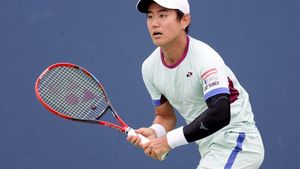On February 8, 2025, the lively streets of Tokyo became the backdrop for a spirited public debate between Kuroda Kanbei, an entertainment policy expert, and Nagayama Daiki, a renowned political commentator. This exchange wasn't just another intellectual exercise; it reflected the deep-rooted passions surrounding the entertainment industry and its future.
Kuroda Kanbei kicked off the debate with a strong argument advocating for stringent regulation within the entertainment sector. "This industry needs serious regulation to protect young artists," he asserted, emphasizing the rising concerns about exploitation and mental health issues among newcomers to the field. His call for reform echoed through the packed auditorium, capturing the attention of those present.
Conversely, Nagayama Daiki countered with fervor, arguing against Kuroda's position. "Regulation stifles creativity; we must let artists express freely," he declared. His response was met with applause from sections of the audience who champion the idea of unrestrained artistic expression as the lifeblood of creativity. The debate exemplified the generational divide on how best to approach the rapidly changing entertainment industry.
The atmosphere was electric, with emotions running high as audience members reacted passionately to the back-and-forth exchanges. Kuroda focused on the moral imperative to protect the vulnerable, pointing out the challenges young artists face, including financial instability and mental health pressures. He stressed, "If we do not put measures in place, we risk losing the very talents we ought to nurture."">
Nagayama, on the other hand, summoned historical precedents, arguing how overly cautious regulations have often crippled artistic innovation. "Look at the music and art movements of the past; they thrived on freedom!" he exclaimed, rallying support from those who fear the detrimental effects regulation could impose on the cultural fabric of society.
With the two speakers representing polarizing views, the audience was left to ponder the balancing act between protecting individuals and nurturing creativity. Each argument summoned valid concerns and aspirations, making it evident how complex and multi-faceted this issue truly is.
The debate was not simply about rules; it was about vision—what kind of values society wishes to uphold as it nurtures its artists. Attendees noted how seldom such discussions take place publicly, and the fact they were witnessing this exchange felt historic. Many felt compelled to engage more deeply with the subject, echoing sentiments of both debate participants.
After the thorough discussion, many left the auditorium buzzing with thoughts, eager to engage their peers on the reflections sparked by Kuroda and Nagayama's compelling arguments.
The outcomes of this debate may very well resonate beyond the day’s discussions, influencing how both policymakers and the public approach the entanglements of regulation and artistic freedom. The conversations ignited by Kuroda Kanbei and Nagayama Daiki could shape the future paths of entertainment policy and artist welfare within Japan.
While some viewers may have left feeling championed for their favored side, the heart of this debate lay not just in winning arguments but opening dialogues between generations and perspectives alike.



